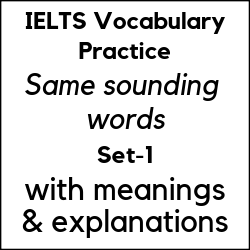This is the first set of a series posts on same-sounding vocabularies, like homonyms and homophones, which is fruitful not only for the IELTS candidates but also for other learners of English. In this post, I’ve tried to focus on some words with the alphabet‘ A’ and ‘B’ which may sound almost or exactly the same, though they have different meanings. I’ve given all the necessary explanations with meanings so that it becomes easier for you all to understand them. Hopefully, it helps all of you to take better preparation in English.
Let’s start then.
Aboard or Abroad?
- She welcomed me aboard.
Here, aboard is an adverb that means on board, on, in, or into a ship, train, airplane, bus, etc.
- Lucy went abroad for higher study.
Here, abroad is an adverb that means in or to a foreign country or countries.
Accept or Except or Expect?
- I accept your application on behalf of the board members.
Here, accept is a verb that means to receive; to acknowledge.
- Everybody was there except Stephen.
Here, except is a preposition that means apart from, excluding.
- The committee expects a great result.
Here, expect is a verb that means wait for, anticipate, look forward to.
Adverse or Averse?
- The match was postponed due to adverse political conditions.
Here, adverse is an adjective that means unfavorable, undesirable.
- They are not averse to public criticism.
Here, averse is a verb that means opposed.
Advice or Advise?
- I took my mom’s advice and left the job.
Here, advice is a noun that means recommendation or suggestion.
- My mom advised me not to open the door.
Here, advise is a verb that means to recommend, to suggest.
Affect or Effect?
- Smoking affects our liver seriously.
Here, affect is a verb that means to act on; produce an effect or change in, to have influence.
- The effect of smoking is lung disease like bronchitis.
Here, effect is a noun that means something that is produced by an agency or cause; result; consequence.
Alley or Ally?
- He lives by this alley. alley (singular), alleys (plural)
Here, alley is a noun that means little lane.
- Robert is working as an ally for us. ally (singular), allies (plural)
Here, ally is a noun that means a friend.
Allowed or Aloud?
- We are not allowed to enter there.
Here, allowed is an adjective that means permitted.
- He allowed me to speak.
Here, allowed is a verb that means to permit.
- She was speaking aloud.
Here, aloud is an adverb that means out loud.
Altar or Alter?
- All the rituals took place before the altar.
Here, altar is a noun that means a raised place or structure where sacrifices are offered and religious rites performed.
- The commission altered their views overnight.
Here, alter is a verb that means to make different in some particular, as size, style, course, or the like; modify.
Aural or Oral?
- Too much sound can affect our aural power.
Here, aural is an adjective that refers to the ears and hearing.
- There are some special oral methods of language teaching.
Here, oral is an adjective that refers to the mouth and speaking.
Berth or Birth?
- There was a special berth on the train.
Here, berth is a noun that means a shelf-like sleeping space, as on a ship, airplane, or railroad car.
- Leonard announced the birth of his second child.
Here, birth is a noun that means the act or process of bearing or bringing forth offspring.
Beside or Besides?
- Your pen is beside your laptop. / May I sit beside you?
Here, beside is used as a preposition which means by the side.
- Besides, I promised her we would come.
Here, besides is an adverb that means in addition.
Board or Bored?
- He wrote on the board.
Here, board is a noun that means a piece of wood.
- The board decided on the terms after an hour of consultation.
Here, board is a noun that means a committee.
- They will soon board on the plane.
Here, board is a verb that means to get on (train, plane, etc.)
- They got bored at his long speech.
Here, bored is an adjective that means uninterested.
Boarder or Border?
- A boarder is a person who pays to live in a boarding or someone’s house.
- A border is the boundary or edge of something or someplace.
Here, both words are noun.
Bought or Brought?
- She bought a very beautiful dress.
Here, bought is the past form of the verb BUY.
- She brought a very beautiful dress.
Here, brought is the past form of the verb BRING.
Breath or Breathe?
- She took a long breath and stopped.
Here, breath is a noun that means the air taken into or expelled from the lungs.
Breath sounds like death.
- She breathes heavily due to her asthma problem.
Here, breathe is a verb that means to take air into the lungs and then expel it.
Breathe sounds like seethe.
If you like this post, please share it with your close ones, and make sure to leave a comment. You can also reach me at ieltsdeal@gmail.com with your queries.
Click here for IELTS vocabulary: 52 most common & important words; with meanings & example sentences
Click here for IELTS vocabulary practice: list of words to use instead of ‘very’

